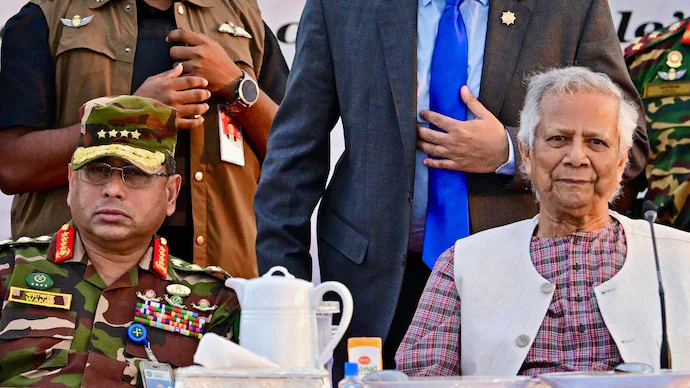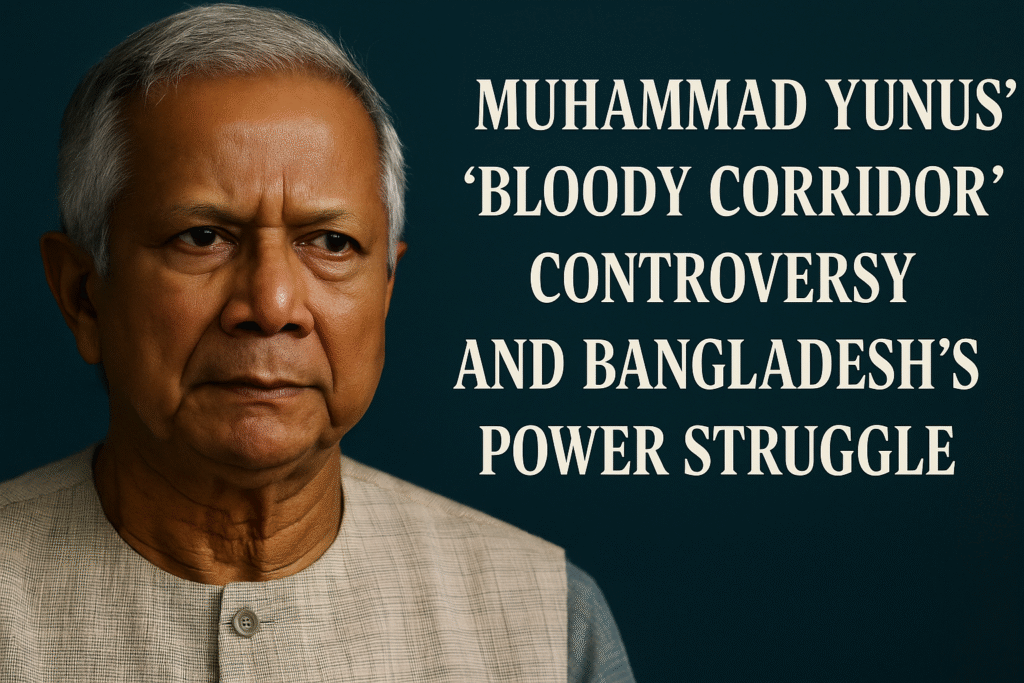
In the bustling political corridors of Dhaka, a storm is brewing that has captured the attention of global onlookers. The Bangladeshi government, led by prominent figures such as Prime Minister Sheikh Hasina and Army Chief Waker Uz Zaman, is entangled in a tense power struggle. At the center of this whirlwind lies Nobel Laureate Muhammad Yunus, a figure revered globally for his revolutionary microfinance initiatives but increasingly contentious in his homeland.
Yunus, often lauded as the pioneer of social business, has found himself under fire amid accusations and counterclaims. His proposed “Rakhine Corridor,” an ambitious project aimed at fostering economic connectivity between Bangladesh and Myanmar’s Rakhine State, has been termed the “Bloody Corridor” by the Bangladeshi Army Chief. This provocative label underscores the complexities and hostilities embroiling the nation’s political and economic landscape.
The Vision of the Rakhine Corridor
The Rakhine Corridor, conceptualized by Yunus, was envisioned as a bridge to enhance economic and cultural ties between Bangladesh and Myanmar. Rooted in his ideals of economic empowerment, Yunus aimed to create a channel that would benefit the impoverished communities on both sides of the border. The corridor’s goals included establishing trade hubs, creating jobs, and fostering bilateral cooperation. However, the vision quickly became a flashpoint for controversy.
Critics of the project argue that it posed significant security threats and failed to consider the ongoing Rohingya crisis, a humanitarian catastrophe that has already strained relations between the two nations. The proposal faced opposition from the Bangladeshi military, with Army Chief Waker Uz Zaman accusing Yunus of undermining national interests. By labeling it the “Bloody Corridor,” Zaman highlighted the potential for exacerbated tensions and violence in the region.
A Nation Divided: Reactions to Yunus’ Proposals
While Yunus enjoys a global reputation for his contributions to poverty alleviation, his initiatives often draw mixed reactions in Bangladesh. The Rakhine Corridor project has polarized the nation, with supporters arguing that it represents an opportunity for economic growth and critics warning of dire consequences.
Prominent politicians and academics have debated the feasibility and implications of the corridor. Supporters emphasize Yunus’ track record of implementing successful grassroots projects, suggesting that the corridor could pave the way for a new era of regional cooperation. However, detractors, particularly within the military, view the project as a strategic liability that could compromise national security.
The Role of the Army in the Controversy
The Bangladeshi military has long played a significant role in shaping the nation’s political landscape. Army Chief Waker Uz Zaman’s vehement opposition to the Rakhine Corridor reflects broader concerns about Yunus’ growing influence. Zaman’s criticism also underscores a deep-seated mistrust between the military and civilian leaders.
Tensions escalated when Zaman openly accused Yunus of pushing a personal agenda at the expense of national security. In a heated address, he stated, “The Rakhine Corridor is not an economic bridge; it’s a gateway to instability.” This statement, coupled with the “Bloody Corridor” epithet, has fueled a narrative that portrays Yunus as a divisive figure in Bangladeshi politics.
Historical Context of Military-Civilian Relations
To understand the current power struggle, it is essential to consider Bangladesh’s history of military interventions and political upheaval. Since its independence in 1971, the nation has experienced several military coups and periods of martial law. These historical experiences have left a legacy of distrust between the military and civilian leaders, shaping the dynamics of contemporary governance.
Yunus’ Response to the Allegations
Amid the growing backlash, Yunus has maintained a defiant stance. He has consistently defended the Rakhine Corridor as a project designed to uplift marginalized communities and foster regional harmony. In a recent press conference, Yunus emphasized, “My vision has always been to empower the underprivileged. The Rakhine Corridor is a step towards achieving that goal.”
Despite his assertions, Yunus’ position remains precarious. Calls for his resignation have intensified, with critics accusing him of overstepping his role as a social entrepreneur. The allegations have tarnished his image within Bangladesh, even as his international reputation remains largely intact.
International Reactions and Implications
The controversy surrounding Yunus and the Rakhine Corridor has not gone unnoticed on the global stage. International observers have expressed concern over the implications of the project and the ensuing power struggle in Bangladesh. Organizations such as the United Nations and regional allies have called for dialogue and reconciliation to address the underlying tensions.
Economic analysts have also weighed in, highlighting the potential benefits and risks of the Rakhine Corridor. While some view it as a strategic opportunity to strengthen regional ties, others warn of the challenges associated with implementing such a project in a volatile geopolitical environment.
Unpacking the Political Fallout
The power struggle in Dhaka has far-reaching consequences for Bangladesh’s political stability and economic prospects. As the nation grapples with the fallout, questions arise about the future of governance and the role of influential figures like Yunus in shaping the country’s trajectory.
The Dynamics of Economic Policy and National Security
Economic initiatives often intersect with national security concerns, particularly in regions fraught with geopolitical tensions. The Rakhine Corridor exemplifies this dynamic, highlighting the challenges of balancing economic development with security imperatives. While Yunus’ vision aligns with his broader philosophy of social entrepreneurship, its implementation necessitates careful navigation of political and security challenges.
The Bangladeshi government has faced criticism for its handling of the controversy. Critics argue that the lack of a cohesive strategy has exacerbated divisions and undermined public confidence. The absence of transparent communication and dialogue has further fueled speculation and mistrust.
Yunus’ Legacy Under Scrutiny
Yunus’ legacy as a Nobel Laureate and global advocate for poverty alleviation is undergoing intense scrutiny. His achievements, including the founding of Grameen Bank and his pioneering work in microfinance, have earned him international acclaim. However, the domestic challenges he faces reflect the complexities of navigating the intersection of social entrepreneurship and politics.
The “Bloody Corridor” controversy has cast a shadow over Yunus’ reputation, raising questions about his motives and methods. Critics argue that his approach to the Rakhine Corridor failed to account for the broader political and security implications. Supporters, however, contend that his vision represents a bold and necessary step towards regional development.
The Broader Implications for Bangladesh
The power struggle in Dhaka is emblematic of broader challenges facing Bangladesh. As the nation strives to position itself as a regional leader, it must address internal divisions and foster a culture of collaboration and inclusivity. The controversy surrounding Yunus highlights the need for robust governance mechanisms and transparent policymaking.
Bangladesh’s economic ambitions are intertwined with its geopolitical realities. The country’s strategic location and growing economy present significant opportunities, but also require careful management of internal and external challenges. The Rakhine Corridor serves as a case study in the complexities of pursuing economic development in a volatile region.
Towards a Path of Reconciliation
Amid the tensions and controversies, there is a growing call for reconciliation and dialogue. Stakeholders from across the political and social spectrum have emphasized the importance of finding common ground and addressing the underlying issues driving the power struggle. International partners have also expressed support for initiatives aimed at fostering stability and cooperation.
The path forward requires a collective commitment to prioritizing national interests and addressing the needs of marginalized communities. The lessons learned from the “Bloody Corridor” controversy can serve as a foundation for building a more inclusive and resilient Bangladesh.
Conclusion: Navigating the Crossroads
Bangladesh stands at a crossroads, grappling with the challenges of balancing economic development, national security, and political stability. The controversy surrounding Muhammad Yunus and the Rakhine Corridor underscores the complexities of navigating these issues in a rapidly changing world.
As the nation charts its path forward, it must draw on the strengths of its people and institutions while addressing the divisions that threaten to undermine progress. The story of the “Bloody Corridor” is not just a tale of controversy, but a reflection of the broader challenges and opportunities facing Bangladesh in the 21st century.

